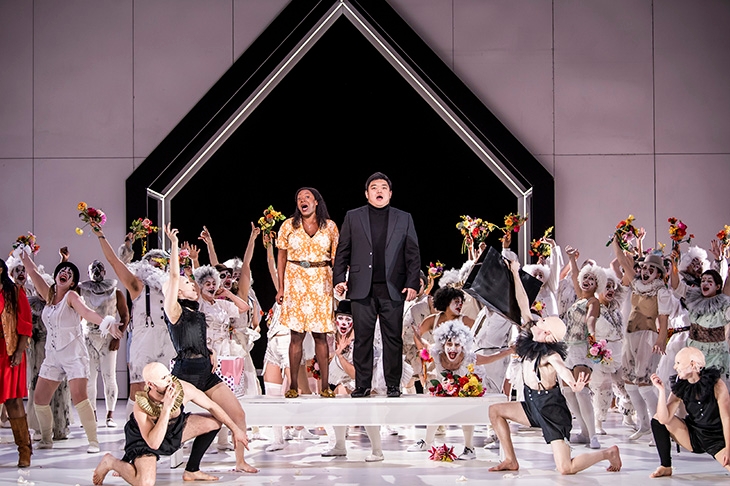The Edinburgh International Festival began with a double helping of incest. Curiously, Greek — Mark-Anthony Turnage’s East End retelling of the Oedipus myth, which was greeted with universal acclaim at its premiere in 1988, and which has gone on to be one of British opera’s biggest export success stories — was tagged on the Festival website as being suitable for ‘risk takers’. Whereas Wagner’s Die Walküre — which ends its first act in ecstatic celebration of a sex act so transgressive that even in 2017 it can draw appalled gasps from an audience — was described as being ideal for ‘traditionalists’. Bizarre. Perhaps brothers and sisters sleep together all the time in Morningside; I couldn’t say.
Greek first, and Joe Hill-Gibbins’s new production for Scottish Opera and Opera Ventures confronts the audience with a dazzling white screen. Out stomps Alex Otterburn as Eddy and stands there, sizing up the audience with a glint in his eye: Dennis the Menace as Droog. Red tracksuits and neon-blue mini-dresses jump cartoonishly out against the whiteness, and words are punched up before us like captions in some oversize adult edition of the Beano. And here, Beano means Heinz. At moments of crisis, real-time video projections fill the backdrop with baked beans, spurting ketchup and live, squirming maggots. Eddy murders his café-owning dad against a full English breakfast, messily deconstructed beyond Gordon Ramsay’s darkest nightmares. Pity the orchestral musicians who have to sit next to the video booth and actually smell it.
Still, Greek deals in extremes. The characters are archetypes who merely happen to speak in the Chas & Dave mockney of Steven Berkoff’s libretto. Susan Bullock as Mum and Andrew Shore as Dad certainly did more than just play it for laughs (though there were plenty of those, at least in the first half). But then there was Allison Cook as Eddy’s wife and (it transpires) mother, singing with a smoky, curdled sensuality that could veer into either brutality or passion. And there was Otterburn as Eddy: an utterly magnetic monster, spitting out the spoken text one minute, singing with an eerie, yearning sweetness and moving with an almost balletic physical agility the next. Controlled and compelling, he was described in the programme as a ‘Scottish Opera Emerging Artist’. I’d say he’s emerged.
As for those ‘risk takers’ — well, there were lots of empty seats. Perhaps too much of the spin around this opera treats it as Thatcher-era agitprop (in fact, Berkoff’s allusions to heat waves and uncollected rubbish locate its inspiration pretty clearly in the late 1970s). And when a hip Festival crowd guffawed at these caricatures of the ghastly white English working class, it wasn’t just the maggots that made me feel slightly queasy. Yet both responses miss the point. The biggest rediscovery of the evening was the startling beauty of the 26-year-old Turnage’s breakthrough score — the bruised lyricism between the outbreaks of ultra-violence (I’ve never heard the notorious sequence where the orchestra hammers on riot shields sound so purely musical). Cor anglais and viola struggle to mourn through the urban racket, while muted brass and baritone sax hint at the blues. Something timeless sings through Greek, and not the least achievement of this terrific production was the way the Scottish Opera orchestra under Stuart Stratford found so much pathos, as well as disgust, in this bona fide modern classic.
There’s not much space to deal with the Royal Scottish National Orchestra’s concert performance of Die Walküre; but then, there can never be enough space for Die Walküre. The cast were as thrilling in performance as they’d looked on paper, with singing of luminous expression and power from Amber Wagner as Sieglinde, and Christine Goerke as a Brünnhilde who grew in compassion before our eyes — overwhelmingly courageous in her final confrontation with Bryn Terfel’s all-too-human Wotan. Terfel’s voice is leaner than it used to be; his commitment to every word and note of this role more passionate than ever. You felt the wounded nobility of Karen Cargill’s Fricka, and while others enjoyed the sound of Simon O’Neill as Siegmund more than I did, his anguish was as compelling as his ardour.
Andrew Davis, conducting, was initially slightly choppy and while there were some ravishingly turned corners (with the RSNO playing in fresh, glowing colours throughout), it didn’t always feel as if voices and orchestra were part of the same musical fabric. This was Wagner conducted like Verdi. But then as Act One progressed Davis — like everyone present — seemed to catch the mighty flood-tide of Wagner’s inspiration and from that point on, routine criticism becomes not just inadequate but impertinent. When Anton Bruckner met Wagner, it was reported that he fell to his knees in awe. After a performance of Die Walküre as heartfelt as this, that can feel like the only reasonable response.






Comments